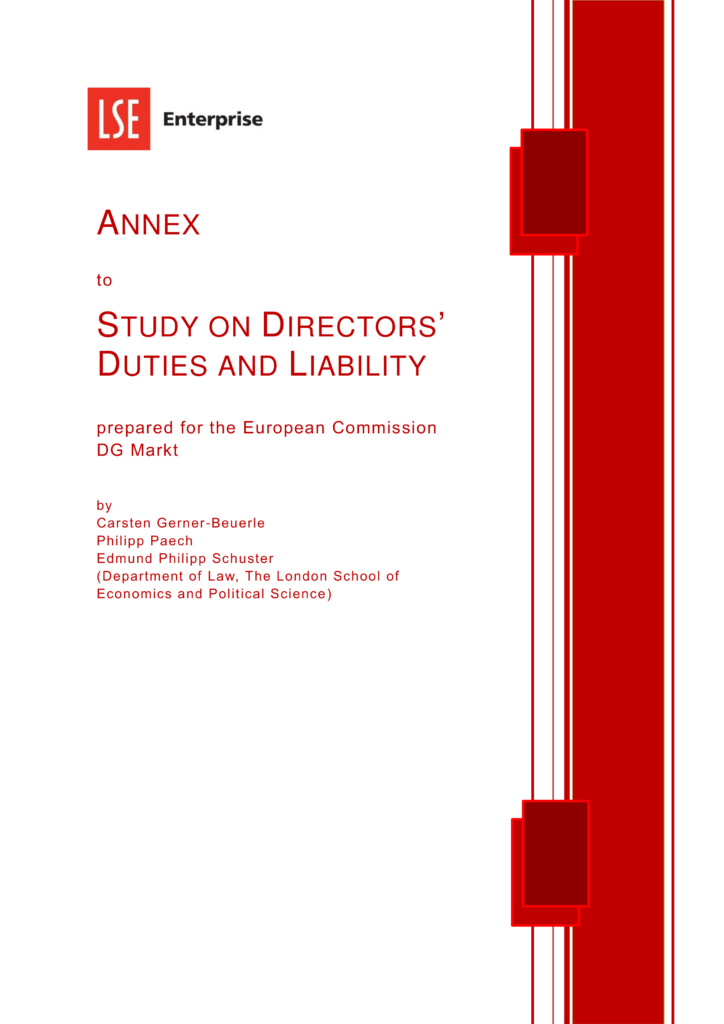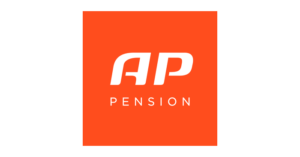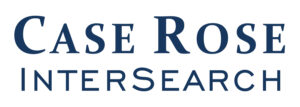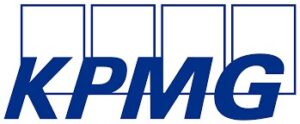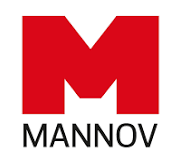KNOWLEDGE SHARING
Board Surveys & White Papers
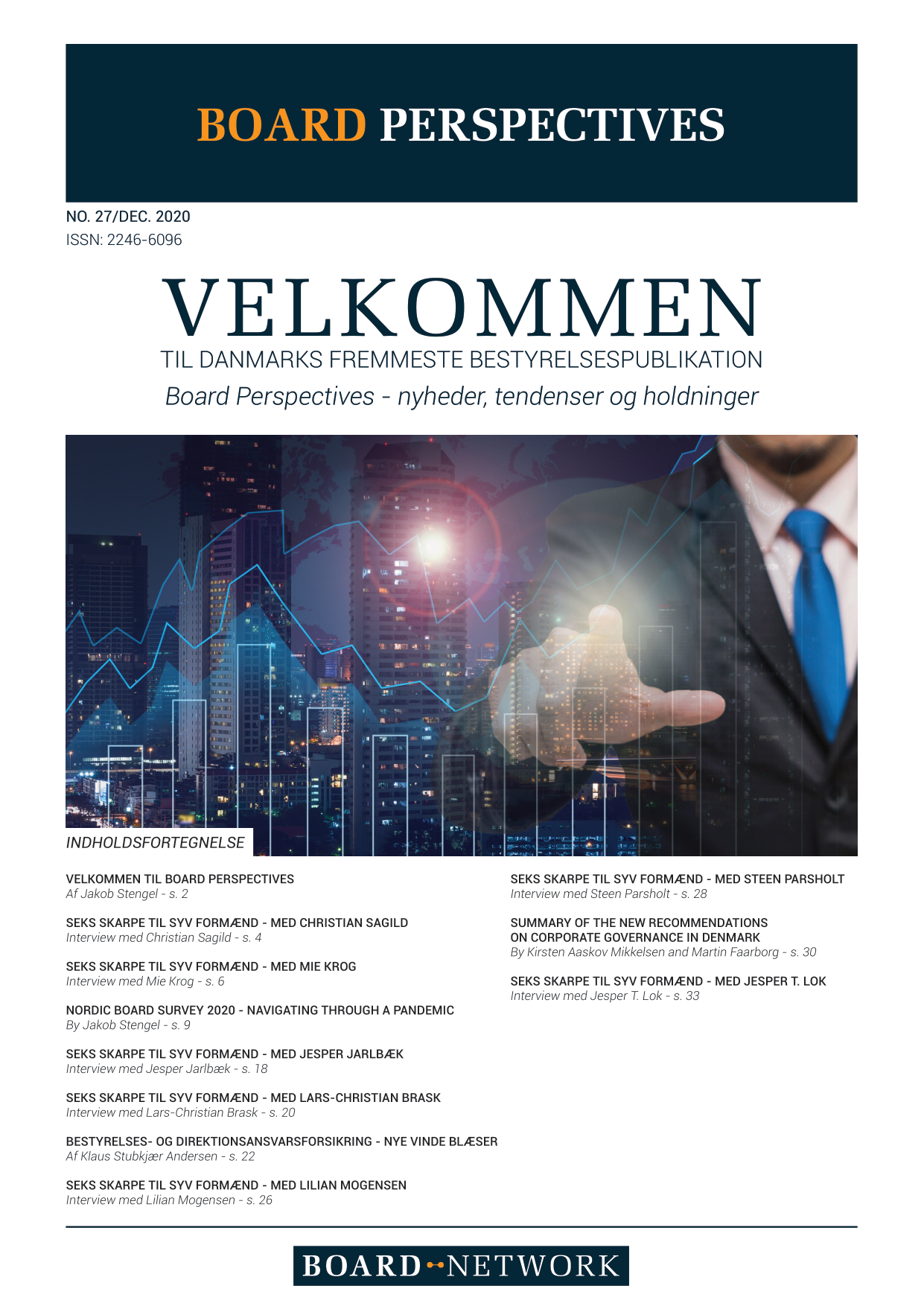
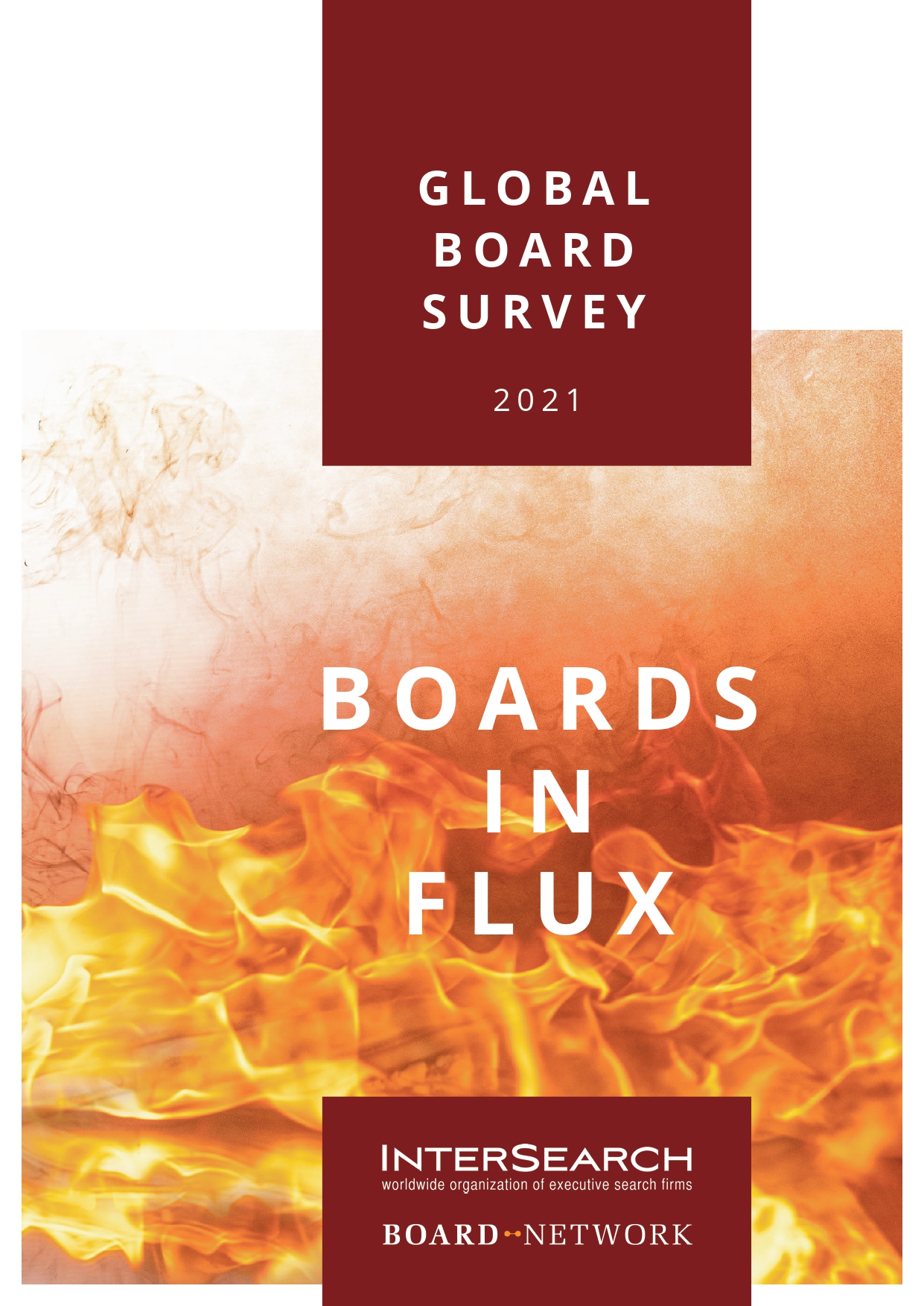
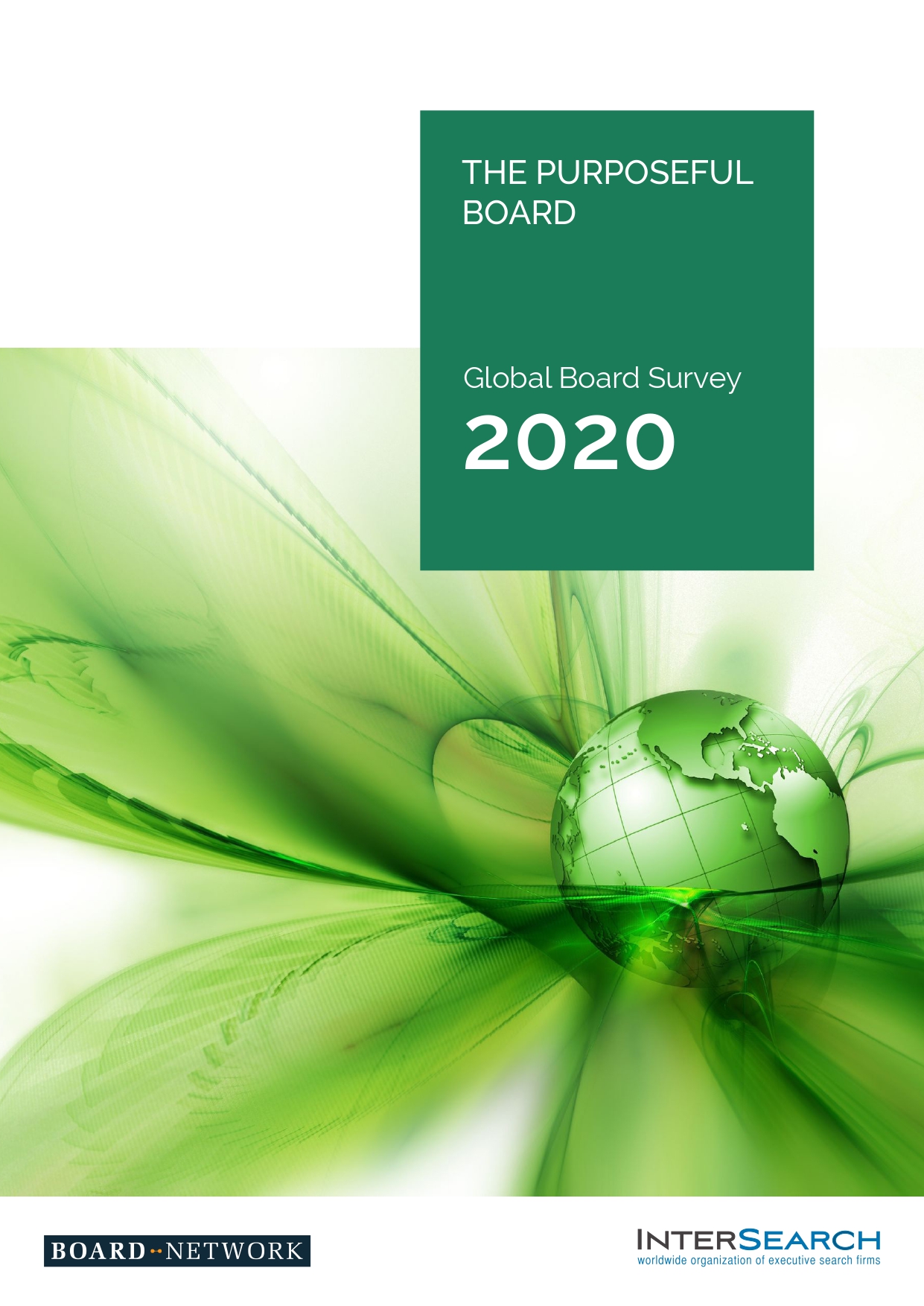
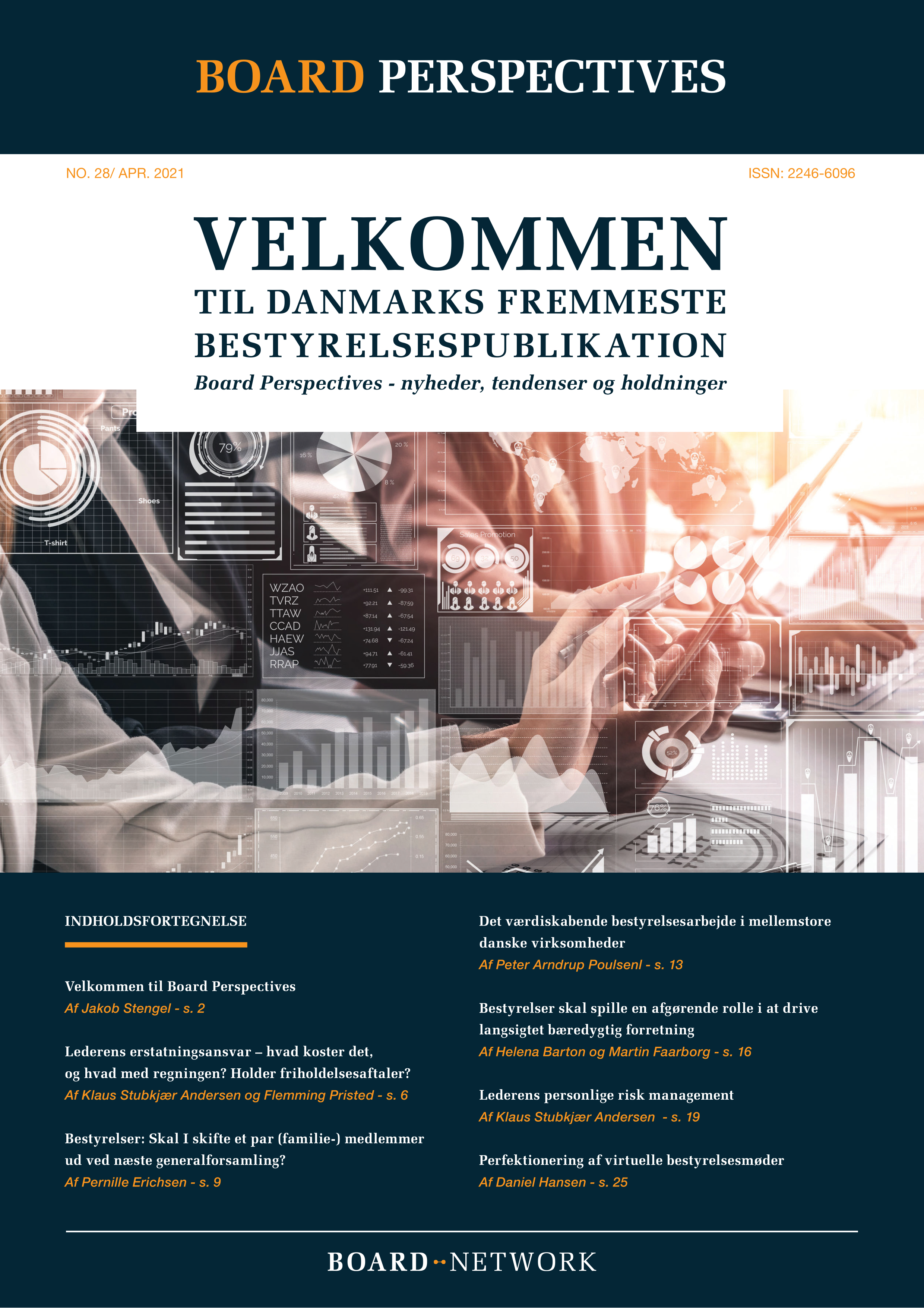
Board Surveys & White Papers
We frequently publish new research, board surveys and white papers for the benefit of our members and stakeholders.
Our goal is to help companies and organizations as well as their management to navigate through changes, to grow the business, increase diversity and to establish the best practice within corporate governance and board leadership.
Most of the knowledge we gather through our surveys and studies is used in our physical network groups.
PARTICIPATE IN THE NEW GLOBAL SURVEY
Board Network along with InterSearch – Worldwide Organization of Executive Search Firms – is currently implementing the 2022 edition of our annual global board survey. Last year we received input from a total of 1,782 respondents from 79 countries.
The survey takes approx. 10-15 min. to complete, and all responses are given anonymously and confidentially. If you would like to participate, please simply click on the link.
In return for your inconvenience, we will of course offer you access to the complete report with all the survey data when the final version is available (expected in November 2022). Thanks in advance for your input.
Board Surveys & White Papers

Global Board Survey 2024
Boards In a Darwinistic Age
2023 saw major events – politically as well as business-wise – that only few would have predicted. Across the world, we are now witnessing wars, political dogma shifts, greater polarization, technological advancements, business model innovation breakthroughs, geopolitical turbulence, terrorism, migration streams, artificial intelligence unfolding, climate change rapidly developing, alternative facts and fake news allegations, digitization of services and products, anti-woke movements, cybercriminals playing a real role in the agenda-setting, etc. Coming from this, corporate boards have never attracted more attention than what we see today; from how they are composed over the influence they carry to how they act and perform, attention is received from the entire organization internally, all the way from the man or woman on the floor and all the way up to the C-suite, but also from politicians, public authorities, media, investors and all the rest of the business environment. With global supply- and value-chains but with growing trends of nationalism, supplemented by corporate scandals, many judged from new ethical standards, and adding increased investor activism, we have all the ingredients needed to put further pressure on the individual contributions to the board and the overall performance by the board. The number of operational activities, and the detail of these activities to which the board is expected to be familiar with, is growing rapidly. The days when business leaders only had to worry about making profits and steering clear of illegalities have long gone. Today, responsibilities and expectations on executives as well as non- executives are much more versatile and subject to significantly tougher scrutiny. This puts a tremendous pressure on political, public, and not least business leaders. They are the ones with the ultimate responsibility for the long-term viability and survival of the businesses they head up – all in a time where the competition can prove to have many forms; size, speed, access to resources, and many more. Survival will only be for the fittest. Between January – February 2024, we asked around our sizeable global network of chairs and board members, and we are very proud to hereby present to you the findings of our Global Board Survey 2024 – Boards in a Darwinistic Age.
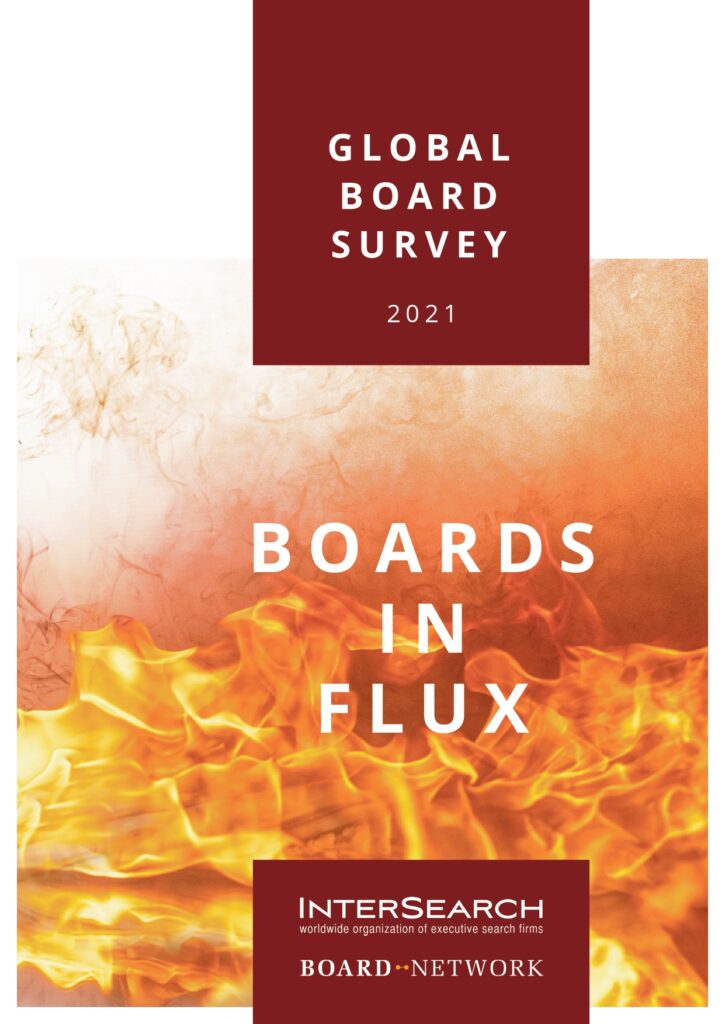
Global Board Survey 2021
Boards In Flux
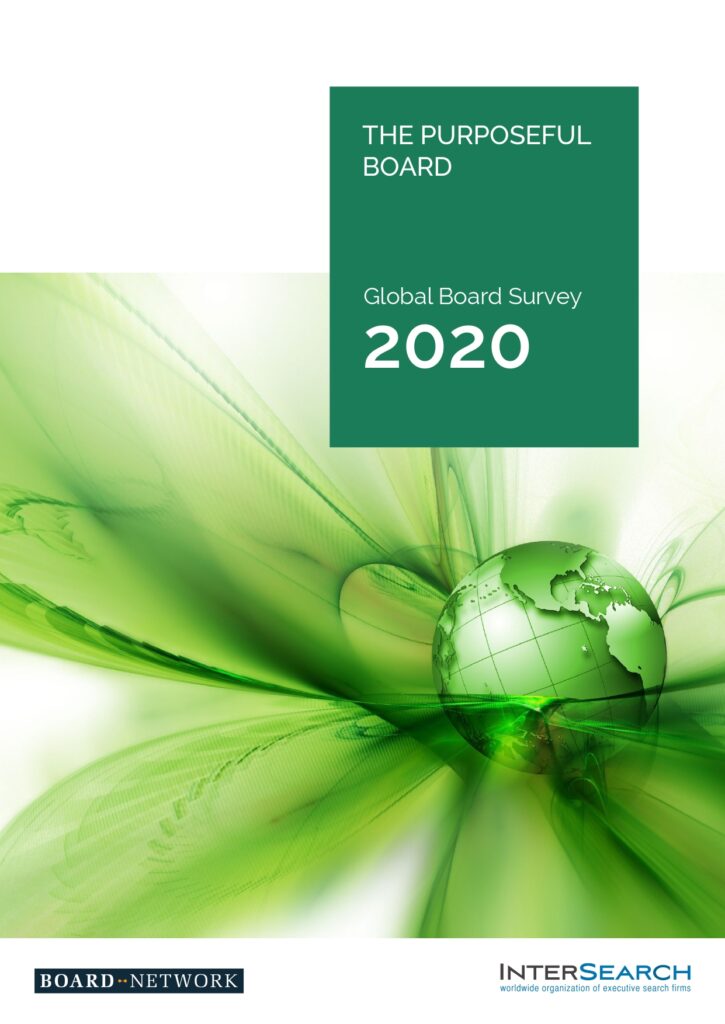
Global Board Survey 2020
The Purposeful Board

Nordic Board Survey 2020
The Future-Proof Board
Board Perspectives
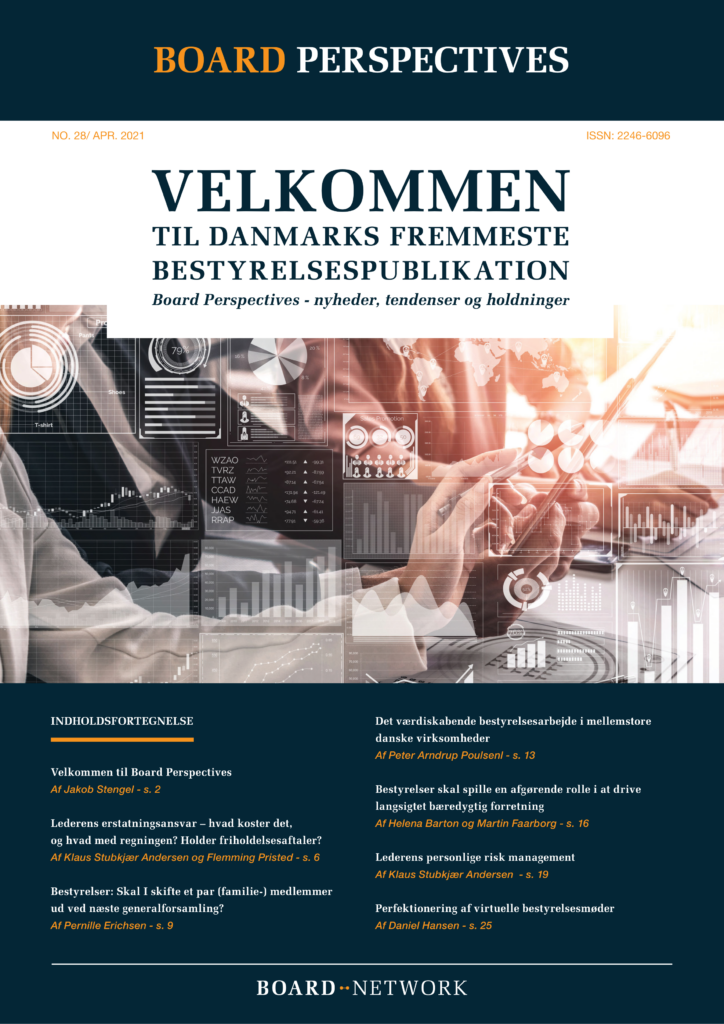
Board perspectives nr. 28
April 2021
The first upcoming physical meeting will be on Thursday the 3rd of June where we hope that infection rates, vaccination efforts and assembly restrictions are all at a level that makes it possible for us to gather again. Until then, we hope that all our loyal members will participate virtually – respectively the 28th of April and the 18th of May. Tendencies and changes are on the board agenda in 2021. Every year Board Network – The Danish Professional Directors Association together with the headhunter company Case Rose / InterSearch identifies the strongest trends and interesting topics, which in the coming year will form the primary framework for the exercise of the board´s work. We focus on the most significant matters We focus on the most significant matters, which will begin to show themselves or whose significance for the board’s work will be strongly enhanced, which will thus affect the upper management layers in the company. Some trends result from legislation, others from soft law, some from international influence, others from market reasons and finally some as a result of larger, external megatrends. The obvious huge influence on the trends this year is of course the still prevailing Corona pandemic. In this year’s analysis, we have therefore identified the following points which will set the agenda for the majority of boards in 2021: 1. The WHY has never been more important. In times of crisis and recession, disagreements and conflicts tend to arise more easily. When everyone feels worn out in terms of health, finances, safety, freedom and/or quality of life, then in every context there is a need for a greater purpose that can bring people together and make them move closer so common goals can be achieved. After more than a year of profound/epoch-making pandemic, the importance of The WHY has proven truer than ever. This is also the case for Danish companies, where work from home and digital meetings in one never-ending race have worn down job satisfaction and motivation to such an extent – and conversely increased the stress level. Imagine if, as an employee, you had to go through all this without knowing the higher purpose? Unfortunately, there are still many who have to – and that is precisely why it will be so incredibly important that the boards, as the highest management, manage to communicate precisely the WHY of their company unequivocally/unambiguously – to employees, customers, suppliers, shareholders besides the stakeholders. 2. Risk Mapping / Scenario Planning has changed in character and meaning. Again, the pandemic is the big factor. It suddenly dawned on us that traditional risk maps with a probability/severity curve are not satisfactory. On the one hand, very few of us had believed that a global pandemic could have such extreme side effects in the form of global restrictions and orders, and on the other hand, the probability of such a pandemic was so low, seen in the eyes of most, that it never figured on their risk map. At the same time, it dawned on us that even in modus of eternal agility and disruption readiness, there are still processes and workflows that we have taken for granted. Here you have been able to find great inspiration in many companies’ transitions from budgeting to rolling forecasts in the financial function – in the form of a constant update of our scenario plans in connection with the development of the pandemic and its constantly changing impact on business´, markets, supply chains, etc. 3. Emergency Succession Plans have also been necessary to put on the agenda for all boards. How are you positioned if one or more members of the executive board are suddenly sick – or even dead? Or if one or more board members are suddenly long-term or permanently unavailable? Succession planning is generally an area where, in the many board evaluations we facilitate each year, we see both a great need and a recognized desire for significant improvement. It has never been more important! 4. Security Issues have also multiplied in both number and consequence over the past 15 months. Not only has cyber risk, for example, generally been a “business” in eternal exponential growth, however with such a sudden transition to homeworking for all organizational layers, as the Corona pandemic has offered, the attacks and uncertainty have exploded. This is naturally due to the typically much lower IT security that most of our homes are surrounded by compared to the workplace. Moreover, the physical security is typically of a lower standard in our homes, which offers completely new risk prevention considerations for the boards. 5. Change in Work Patterns. It is mentioned above, but also needs its own completely independent point. In our Nordic board survey from autumn 2020 (with 251 respondents), we could see that fully 81% of boards had switched to virtual board meetings, while 46% had held more meetings than planned. This has forced many IT-inexperienced board members to suddenly have to familiarize themselves with the many possibilities of technology (which must be considered a plus), but it has also reduced the number of strategic and more innovation-oriented discussions in the boards. This kind of discussion unfolds unequivocally/unambiguously best in a room where everyone is present at the same time. 6. Increased Push for Digitization. Imagine that the pandemic had hit us in 2000. In that case, we would have had to try to…

Board Perspectives nr. 27
December 2020
Welcome to this twenty-seventh issue of Board Perspectives from Board Network, The Danish Professional Directors Association. Board Perspectives is aimed at everyone who is interested in the board agenda in Denmark and is the most outstanding Danish publication with a focus on Corporate Governance and Board Leadership. Board Perspectives is published quarterly – and offers several articles in each issue, written by leading, external experts as well as interviews, news and much more. The focus is on content over form – and on news angles and approaches with an edge. In this issue, partly through a Nordic board survey with a total of 251 respondents, we have zoomed in on the top managers’ and boards’ handling of what is probably the biggest global crisis in peacetime; The Covid19 pandemic, partly we have conducted qualitative interviews with seven leading board chairmen. Thanks to Lilian Mogensen, Mie Krog, Jesper Jarlbæk, Lars-Christian Brask, Steen Parsholt, Jesper Lok and Christian Sagild! Finally, we have received contributions from Klaus Stubkjær Andersen (RiskPoint) regarding the price development of D&O insurance, as well as from Kirsten Aaskov Mikkelsen and Martin Faarborg (both Deloitte) regarding the just published Corporate Governance recommendations. A big thank you also to Klaus, Kirsten, and Martin. Board Network expands – and moves to new and larger premises in Hellerup Despite Covid19, we at Board Network have been extremely busy in 2020 and have thus expanded both the activities and the organization.
You may already have had the opportunity to speak to our new colleagues, Patrick Stochflet Nielsen, and Nikolaj Anthony Schmidt – but otherwise we hope that you would like to stop by us at the start of the new year in our new domicile at Strandvejen 100, 2900 Hellerup! The next meeting will therefore be on Tuesday the 9th of March, where we hope that the infection rate, vaccination efforts and assembly restrictions are all at a level that makes it possible for us to gather again. As mentioned, the theme is “Governance for the Long-Term”, where the focus is on the Nordic governance model, which has always been known for its sustainable and long-term focus. It comes i.a. expressed in the ownership structures, where e.g., the family ownership, the foundations and the pension funds have always played a big role. This can also be seen in the world-leading position that the Nordic countries always have played in the prioritization of sustainability, triple bottom line, value-based management, the company’s why and the SDGs.
We are very much looking forward to this exciting day with a usual strong line-up of both Danish and international speakers! More on this will follow soon. Our latest initiative – The Chambers On countless calls, we have spent the summer and autumn creating and putting together a genuine novelty: The Chambers! The Chambers are different, smaller groups of max. 18 members each, where all members get access to the latest trends, the newest research, the most skilled facilitators, the sharpest speakers – and not least a smaller and confidential peer-to-peer forum with the very best conditions for sparring, knowledge sharing and exchange of experience. We are very proud that we have already managed to put together four full groups – and have started the recruitment for three further groups. It is worth noting that we are establishing independent groups on both sides of ’Storebælt’ (Zealand and Jutland) – to also be able to satisfy the high demand in Jutland and Funen. In The Chambers, we meet five times a year in a roundtable format. Similar to our “normal” conferences in The Community, all meetings are held confidentially under The Chatham House Rule. Membership is personal and new members are admitted continuously. Contact us at info@boardnetwork.dk if you have any questions about this and/or wish to apply for membership. Welcome again to the twenty-seventh issue of Board Perspectives. We wish you a really good reading.
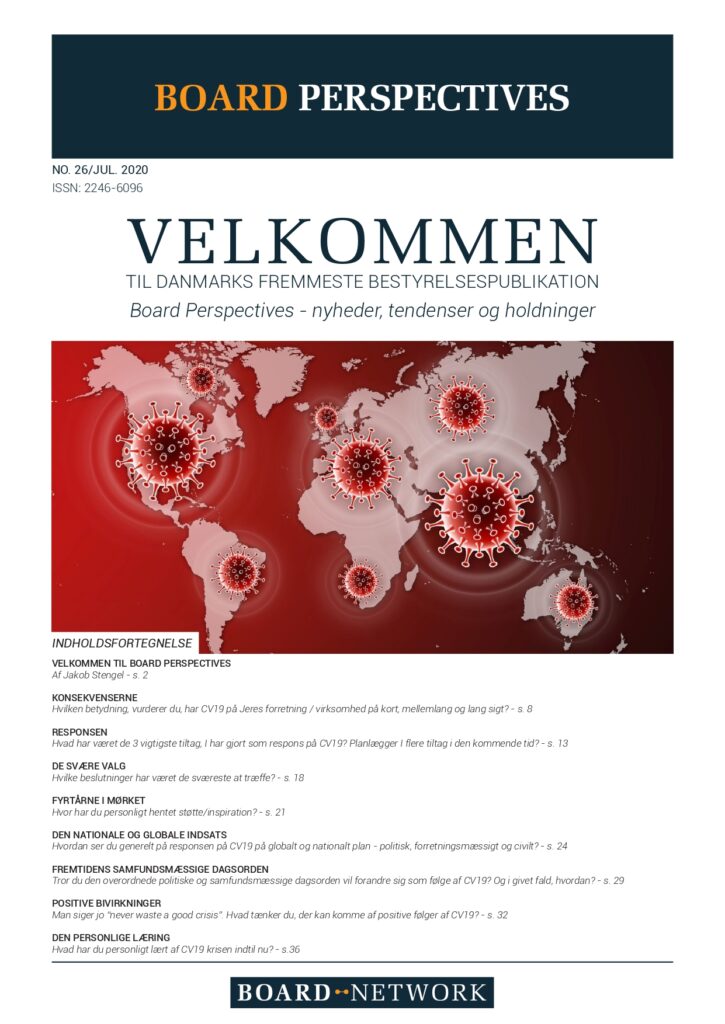
Board Perspectives nr. 26
July 2020
Welcome to this twenty-sixth issue of Board Perspectives from Board Network, The Danish Professional Directors Association. Board Perspectives is aimed at everyone who is interested in the board agenda in Denmark and is the most outstanding Danish publication with a focus on Corporate Governance and Board Leadership. Board Perspectives is published quarterly – and each issue offers a number of articles, written by leading, external experts as well as interviews, news and much more. The focus is on content over form – and on news angles and approaches with an edge. In this special issue, where we have zoomed in very closely on the top managers’ and boards’ handling of what is probably the biggest global crisis in peacetime; Covid19 pandemic, we have received contributions from 25 Scandinavian top managers. Thus, we conducted interviews with 16 Danes, 6 Norwegians and 3 Swedes in June and July. Of these 17 have been men, 8 women, and out of the 25, 15 are board professionals and 10 are C-suite executives. How have Scandinavia’s leading business leaders tackled all the never-before-seen challenges? And how have they been able to identify and exploit new opportunities? In this edition of Board Perspectives, you get the first-hand reports of the tough decisions, the actions that have been made and the personal learnings. “When you’re going through hell, keep going” (Winston Churchill) It is probably not too much to say that Covid19 has hit the entire globe like a real Black Swan – despite numerous, also significant voices, in the global debate over the last 10 years, about the increasing risk of a real, life-threatening pandemic, the majority of the world’s state leaders, health authorities, top managers and advisers, only an extremely few have taken this risk really seriously. We had learned from previous outbreaks of e.g., SARS and MERS, that Corona viruses etc. were relatively easy to detect and contain – not at least because of the short incubation period and high fatality rate – i.e., short incubation period and high fatality rate. Thus, we believed that if a pandemic ever flared up again, we would easily be able to contain and suppress it. How wrong were we right there!? Thousands of annual risk maps in even the largest and most well-managed international groups may have scored a pandemic high on severity, but so low on probability that the risk has completely slipped out of the risk map. And the companies have not been alone; The Danish government’s sale of the Statens Serum Institut’s vaccine production and virtually all EU countries’ lack of sufficient stocks of reliable protective equipment are just two examples of how we grossly underestimated the risk of a pandemic like Covid19.
Even worse, however, it has been that so incredibly few had made it clear how inter-dependent our world and our business life everywhere has become in terms of the fierce globalization of the last two decades. An outbreak and a resulting lockdown in e.g., China could thus immediately be read in the supply chains in the rest of the world. Because we didn’t have the imagination to imagine an industrial and production scenario that reminded just a little of the whole defining moment in the financial crisis, The crash of Lehmann Brothers. Otherwise, Lehmann was precisely the worst imaginable domino piece that could topple at the time – because it was the most interconnected bank with the most external relations to other financial institutions – in the entire global financial sector! Ergo, in early 2020, the whole world was “sitting ducks” in a real life-threatening Corona pandemic – and we could all witness that we were left to a reactive crisis management scenario. And how did it go? Incredibly different – both between countries that chose almost identical solutions – and (of course) also between countries that chose very opposite solutions. It is not our intention to point fingers at anyone here – no one at Board Network had made these risks clearer than anyone else. It is just an observation that we should probably rethink at least the following elements in our governance models – and this applies to all companies, not just the largest: 1. Cash is once again King! Being able to draw on solid liquidity has been a clear competitive advantage through this crisis 2. Single-stranded but long supply chains are extremely vulnerable – and should thus be immediately revised to combine min. one new (series of) supplier(s) – in a different country, and preferably also on a different continent, than the primary supplier 3. Long chain of command with considerable amounts of bureaucracy in the decision-making process is not appropriate. The art going forward will be to balance this consideration against the increasing demands of the outside world for compliance and documentation. One possible solution is to take advantage of the digital quantum leap, which the crisis’ pronounced use of Skype, Zoom and Teams has increased…

Board Perspectives nr. 25
March 2020
Welcome to the twenty-fifth issue of Board Perspectives from Board Network, The Danish Professional Directors Association. Board Perspectives is aimed at everyone who is interested in the board agenda in Denmark and is the most outstanding Danish publication with a focus on Corporate Governance and Board Leadership. Board Perspectives is published quarterly – and each issue offers several articles, written by leading, external experts as well as interviews, news and much more. The focus is on content over form – and on news angles and approaches with an edge. In this issue, we have received contributions from Nordic CEO & Partner Anders Dons and Head of Corporate Governance & Partner Martin Faarborg, both Deloitte, Senior Security Advisor Jesper Helbrandt, IFCR, Liabilities Underwriter Jens Zakarias, RiskPoint, Partner Anne Sophie Scavenius, Mannov, Chairman of the Board Poul Skadhede, Valcon, Country Manager Daniel Hansen, Admincontrol, and Head of PR Nikolaj Henum, AVT Business School. “Businesses must have a purpose beyond profit” Since recently, Board Network, in close collaboration with one of the world’s largest and leading headhunting companies, InterSearch, has conducted the largest board survey ever with a Danish benchmark; Global Board Survey 2010 – The Purposeful Board. The report is based on a global survey with a total of 1,592 board members from 72 countries and will be published on the 10th of March 2020.
From this survey, it appears that the strongest megatrend among global board members is climate change for the first time ever. Similarly, the leading global board trend is for the first time the increased focus on sustainability. This is a significant shift from a clear focus on digitalization, innovation, and growth to a much greater degree of including social, environmental and stakeholder considerations in the overall running and management of companies – not just in Denmark, but worldwide.
Corporate Governance
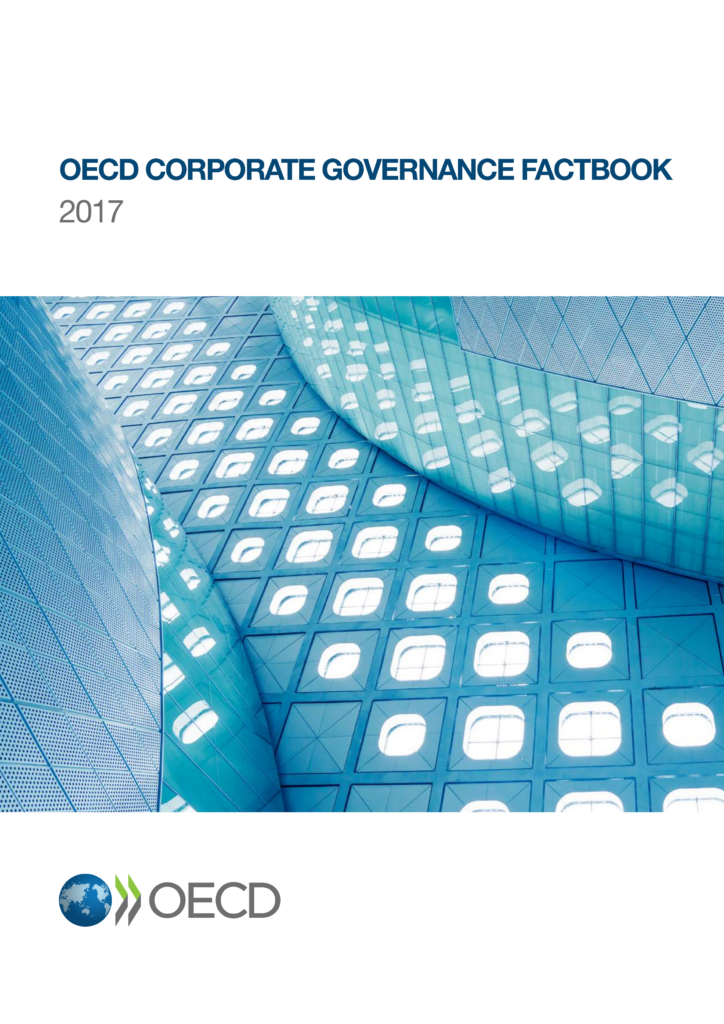
OECD Corporate Governance Factbook 2017
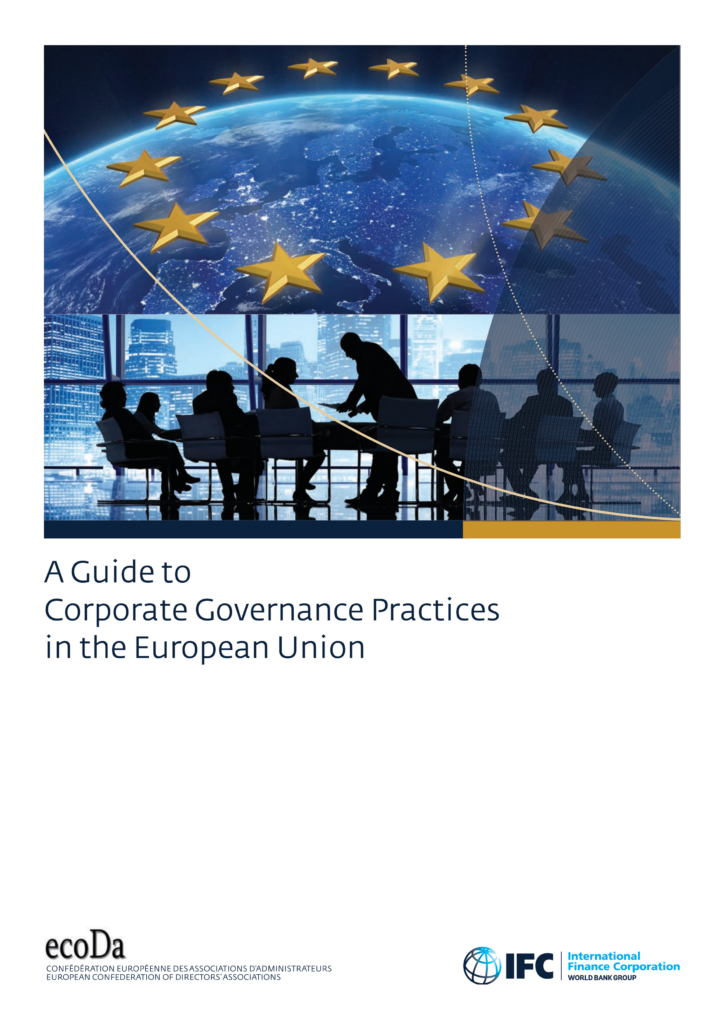
A Guide to Corporate Governance Practices in the European Union 2015
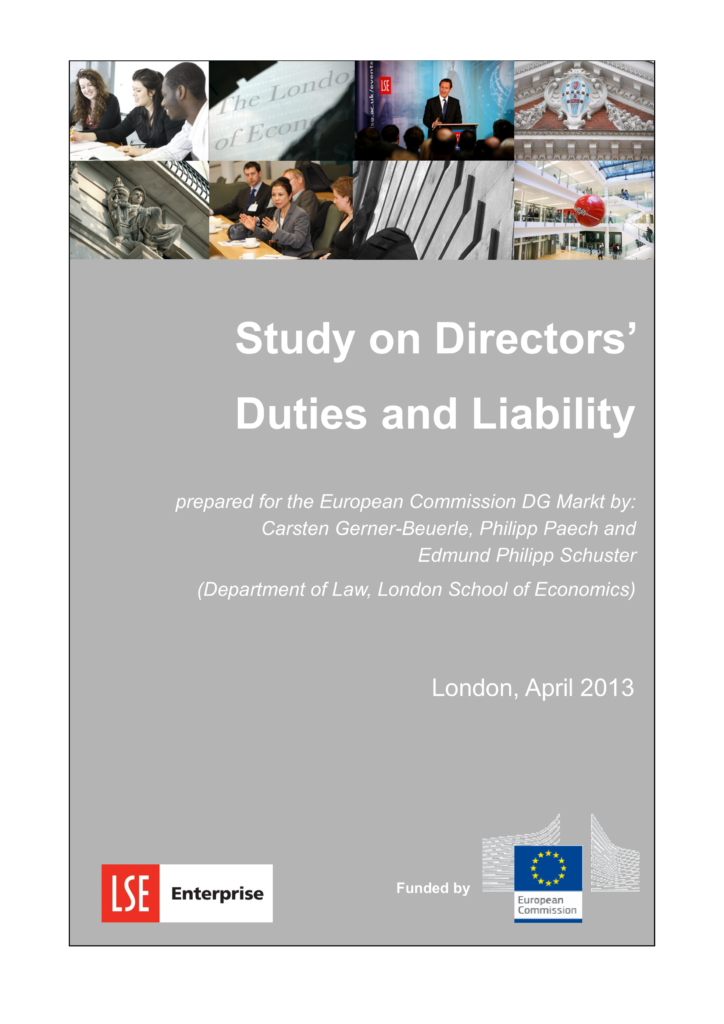
Study on Directors' Duties and Liability 2013
